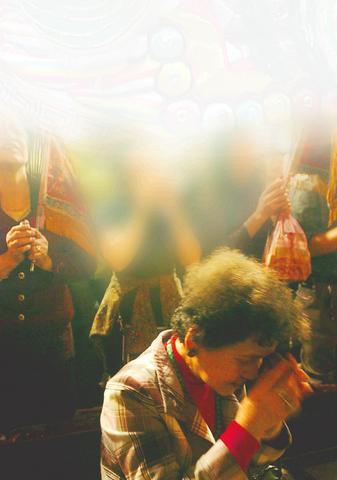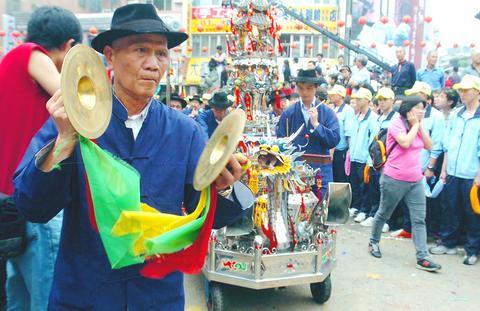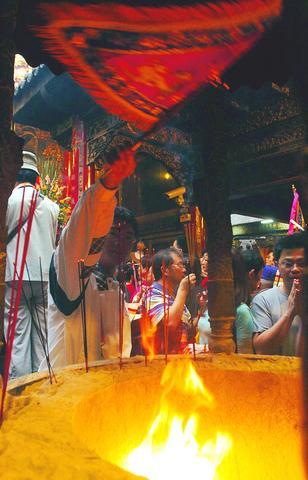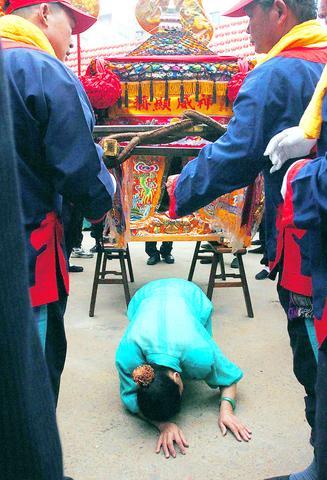At 10:10pm last night the narrow streets adjacent to the Jenlan Temple
The normally sleepy town was transformed into a giant, all-day night market, with crowds shoulder to shoulder in a chaotic jumble that inexplicably moved in the right directions. At one point yesterday afternoon, President Chen Shui-bian (

PHOTO: CHIANG YING-YING, TAIPEI TIMES
Originating in China during the Qing Dynasty (1644-1911), the pilgrimage was outlawed by the Japanese in Taiwan during their occupation between 1895 and 1945. Although local farmers and fishermen began their own mini-Matsu pilgrimage shortly after the surrender of the Imperial Japanese Army on Taiwan in 1945, the pomp and circumstance that surrounds today's pilgrimage began in earnest in 1987, when a reported 100,000 people participated in the event.

PHOTO: CHIANG YING-YING, TAIPEI TIMES
Since then, the pilgrimage has gone from strength to strength and now attracts hundreds of thousands of participants and is watched by over a million onlookers as it crisscrosses west-central Taiwan. It lasts for eight days and seven nights and passes through 53 towns in three counties. By April 25, when the thousands of devotees who choose to follow the pilgrimage's round-trip journey through the countryside and back to Jenlan Temple, which is run by controversial independent legislator, Yen Chin-piao
Along the way, well over a million people will have witnessed the procession as it passes by their homes to mark the 1,118th anniversary of Matsu attaining the status of a goddess.

PHOTO: CHIANG YING-YING, TAIPEI TIMES
"The festival gets bigger every year and now it's impossible to put a number on the amount of people who take part in it. [Matsu] is one of the most revered gods not only in Taiwan, but all around the world," said Yen. "People from local communities participate. People from all over Taiwan come, as well as visitors from Japan, China and other countries."

PHOTO: CHIANG YING-YING, TAIPEI TIMES
The pious, travelling on foot, bicycle, scooter and in cars, follow the goddess' effigy, which is carried at shoulder height by groups of bearers for the entire journey. Every year, the pilgrimage brings with it horrendous traffic congestion.
Delays are commonplace, yet worshippers and the curious alike are happy to wait several hours just to catch a glimpse of the goddess that has become the nation's semi-official patron saint.
Yesterday, Tachia's main drag and all the roads leading to the Jenlan Temple were completely blocked and are set to remain so until the pilgrimage finally begins snaking its way toward Nanyao Temple
The Heavenly Mother, or the Goddess of the Sea, as Matsu is often referred to in Taiwan, is thought to have originally been a woman named Lin Mo-liang who lived in China during the Song Dynasty (960-1127).
"Along with being the Goddess of the Sea, Matsu is also the Goddess of virtue and righteousness. Although Taiwan's people may worship many different gods and follow many different paths, Matsu unites them and is revered by all," said Cheng Ming-kun,
More than religion
Once a purely religious event, the annual pilgrimage has become politicized and been turned into a tourist event and a media circus in recent years.
The Taichung County Government officially named the pilgrimage the Tachia Matsu Cultural Festival
It all may sound like hell rather than a religious festival centered on peace and harmony, but Tachia residents such as Lee Fong-yin
"It has its drawbacks, sure, but Tachia is not a rich town and the event brings in thousands of money-spending outsiders all of whom have to eat, drink, sleep and spend money," said the taxi driver. "I earn more money ferrying people to and from the town at this time of year than I usually earn in a week, or maybe two. Last year I made over NT$8,000 in about six hours."
Politicization and tourism aside, the pilgrimage is still overseen by the numerous temples and related organizations. Uniformed groups and temple employees composed of middle-aged women and large numbers of thuggish-looking types direct traffic as best they can and ensure that the nobody is injured in the melee that follows directly in the palanquin's wake.
Trouble in the name of religion
While the untrained and unsupervised temple groups wield some control over the proceedings and try to maintain the pilgrimage's congenial and festive atmosphere, trouble often erupts.
The most volatile aspect of the pilgrimage is when the palanquin passes from one district into another and the bearers change. Rival gangs with stronger mob ties than religious beliefs often start scuffles over which group has the right the bear the effigy of Matsu on whose turf.
While one heavily tattooed temple official, who declined to give his name, explained that such behavior was expected and that "it is because they are true devotees and wish to prove this to the goddess," the "high-spirited" fracases have been known to spiral out of control.
Last year, members of various Eight Generals
"This year there will not be any trouble. We've told the different groups that such acts hurt everyone. We have a list of those who have been banned from participating and they will be arrested if they try to cause trouble," said Yen, who is rumored to have once been a leading gangland figure himself. "Not only were the pilgrims not happy, but Matsu is a goddess of peace and she frowns on anyone who pursues a road of violence".
Specialists in a form of "temple-procession art" that combines self-flagellation with martial arts and dance, Eight Generals groups traditionally acted as religious policemen entrusted with the task of arresting evil spirits. In recent years, however, many of the groups have become coopted by gangs and now attract tattooed, teenage gangster wannabes.
With large numbers of people armed with obsolete, yet deadly weaponry and overcome with religious fervor and drunk, Yen's words may fall on deaf ears. Yet, even if violence erupts again, Yen doesn't think it will hurt the festival, but will instead only hurt those who engage in violence.
"The pictures were broadcast nationwide, but I don't see any drop in the number of people coming here or being put off by what they saw," he said. "People know that the bad element will be punished by Matsu."

This is the year that the demographic crisis will begin to impact people’s lives. This will create pressures on treatment and hiring of foreigners. Regardless of whatever technological breakthroughs happen, the real value will come from digesting and productively applying existing technologies in new and creative ways. INTRODUCING BASIC SERVICES BREAKDOWNS At some point soon, we will begin to witness a breakdown in basic services. Initially, it will be limited and sporadic, but the frequency and newsworthiness of the incidents will only continue to accelerate dramatically in the coming years. Here in central Taiwan, many basic services are severely understaffed, and

Jan. 5 to Jan. 11 Of the more than 3,000km of sugar railway that once criss-crossed central and southern Taiwan, just 16.1km remain in operation today. By the time Dafydd Fell began photographing the network in earnest in 1994, it was already well past its heyday. The system had been significantly cut back, leaving behind abandoned stations, rusting rolling stock and crumbling facilities. This reduction continued during the five years of his documentation, adding urgency to his task. As passenger services had already ceased by then, Fell had to wait for the sugarcane harvest season each year, which typically ran from

It’s a good thing that 2025 is over. Yes, I fully expect we will look back on the year with nostalgia, once we have experienced this year and 2027. Traditionally at New Years much discourse is devoted to discussing what happened the previous year. Let’s have a look at what didn’t happen. Many bad things did not happen. The People’s Republic of China (PRC) did not attack Taiwan. We didn’t have a massive, destructive earthquake or drought. We didn’t have a major human pandemic. No widespread unemployment or other destructive social events. Nothing serious was done about Taiwan’s swelling birth rate catastrophe.

Words of the Year are not just interesting, they are telling. They are language and attitude barometers that measure what a country sees as important. The trending vocabulary around AI last year reveals a stark divergence in what each society notices and responds to the technological shift. For the Anglosphere it’s fatigue. For China it’s ambition. For Taiwan, it’s pragmatic vigilance. In Taiwan’s annual “representative character” vote, “recall” (罷) took the top spot with over 15,000 votes, followed closely by “scam” (詐). While “recall” speaks to the island’s partisan deadlock — a year defined by legislative recall campaigns and a public exhausted